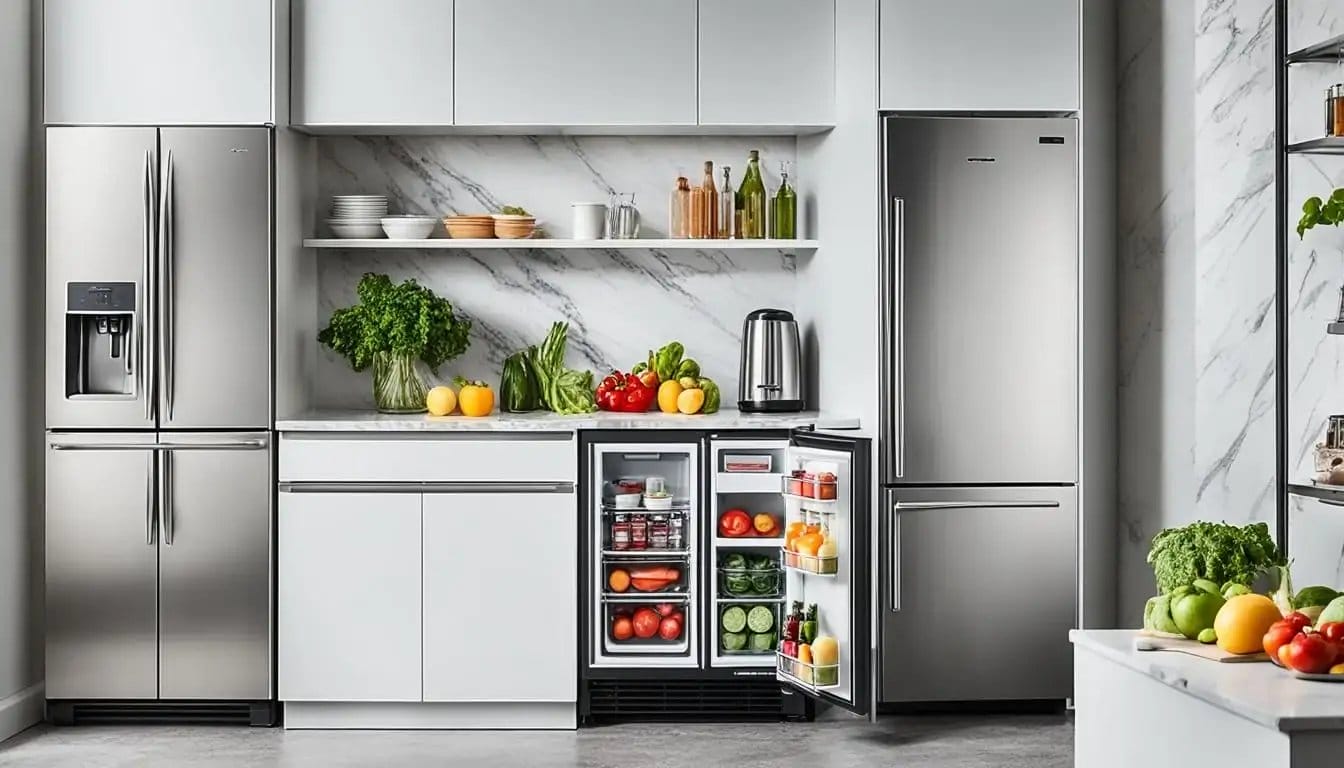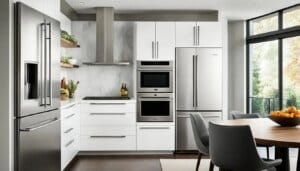When choosing between a small fridge and a small freezer, it can be overwhelming to decide which one is the best compact appliance for your needs. Both options offer convenient storage solutions for food and beverages, but they have their own unique features and considerations to take into account.
In this guide, I’ll explore the essential differences between these two appliances: the size and design variations available, and the energy consumption. Understanding these factors, you’ll make an informed choice and find the best compact appliance for your needs.
Key Takeaways:
- Mini fridges and mini freezers offer compact solutions for storing food and beverages.
- Mini fridges provide cooling storage, while mini freezers are specifically built for freezing items.
- Consider factors like size, design, energy consumption, and storage capacity when comparing these appliances.
- Mini fridges are more versatile, as they can store both food and drinks; only few models have a (tiny) freezer compartment.
- Mini freezers are ideal for freezing items like meals and ice cream but are not fit for cooling storage.
Mini Fridges And Mini Freezers: The Basic Different
To understand the differences between mini fridges and mini freezers, it’s important to look at their essential features and functions.
1. The Essential Differences Explained
- Mini fridges are designed to provide cooling storage for food and beverages, while mini freezers are specifically built for freezing items.
- Mini fridges prioritize maintaining a cool temperature, often between 32°F (0 Celsius) and 60°F (16 Celsius), to ensure the freshness and preservation of perishable items and beverages.
- Mini freezers prioritize sub-zero temperatures for freezing food, often between 0°F (-18 Celsius) and -10°F (-23 Celsius), to freeze and store items for extended periods.
- This fundamental difference in purpose determines how these appliances are structured and how they operate.
2. Size And Design Variations
- Both mini fridges and mini freezers come in various sizes and designs to accommodate different needs and space constraints.
- Mini fridges range from compact countertop models that can fit on a small table or desk to larger freestanding units that provide more storage capacity.
- Similarly, mini freezers come in different sizes, including compact models that can fit on a countertop or table, as well as larger standalone units.
- The size and design of these appliances should be considered in relation to the available space and the amount of storage you require.
3. Energy Consumption For Compact Appliances
- Energy consumption is an essential consideration when choosing between mini fridges and mini freezers, as compact appliances can vary in terms of efficiency.
- Mini fridges and mini freezers often have different power requirements, and their energy consumption can depend on factors such as insulation, cooling technology, and temperature settings.
- Assess the energy efficiency ratings and estimated annual energy usage of these appliances to determine their impact on your electricity bill and overall sustainability.
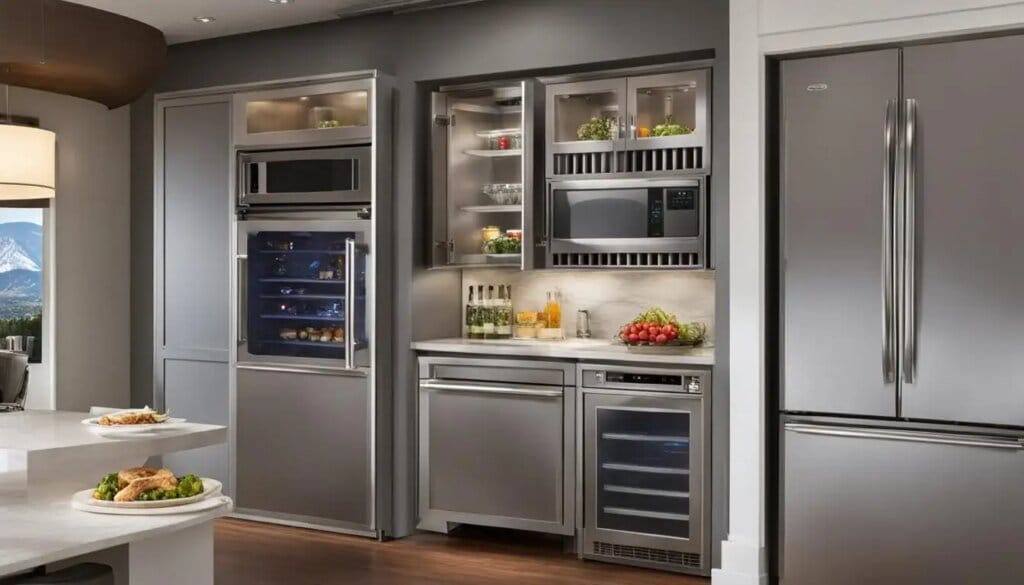
Mini Fridge vs Mini Freezer: Pros & Cons Of Each
Both mini fridges and mini freezers offer unique advantages and drawbacks. Weighing the pros and cons of each option, you can determine which appliance aligns with your specific needs.
Let’s take a closer look at each option.
Mini Fridge Pros
- Convenient cooling storage for perishable items and beverages.
- Perfect for dorm rooms, offices, and small living spaces.
- Versatile – can store both food and drinks.
Mini Fridge Cons
- May have limited cooling storage capacity.
- The compact size may not meet your needs for cooling storage, or to accommodate larger items.
Mini Freezer Pros
- Ideal for freezing items like frozen meals, ice cream, and more.
- Provides additional freezing capabilities.
Mini Freezer Cons
- Requires additional space due to the freezing component.
- Are not fit for cooling storagedue to their sub-zero environment.
Comparing Performance And Convenience
Performance is a crucial factor to consider. Evaluating the cooling and freezing capabilities, temperature control, and uniformity of these compact appliances is essential to ensure they meet your storage needs. Additionally, considering the capacity and storage solutions for small spaces can help you make an informed decision.
Let’s get into these performance factors and explore how they impact your choice.
1. Evaluating Temperature Control And Uniformity
A key aspect of comparing the performance of mini fridges and mini freezers is the ability to maintain a consistent temperature and ensure uniform cooling throughout the appliance.
- A mini fridge should be equipped with reliable temperature control mechanisms that can keep your perishable items fresh by preventing fluctuations in temperature.
- Similarly, a mini freezer should be capable of reaching and maintaining low temperatures to freeze items effectively.
2. Capacity: Storage Solutions For Small Spaces
Storage capacity is a crucial consideration, especially for small spaces.
- Mini fridges and mini freezers are designed with space constraints in mind, offering storage solutions that maximize the available space without compromising functionality.
- Whether you need to store beverages, perishable items, or frozen meals, evaluating the capacity and interior layout of the appliance will help ensure it can accommodate your specific storage needs.
Mini Fridges With Freezers
Mini fridges with freezers offer a range of features and benefits. One essential consideration when choosing such a refrigerator is whether the freezer is integrated into the main compartment or if it is a separate space.
Let’s explore the advantages of each option and the benefits of modern mini fridges.
Freezer Compartment vs Separate Freezer
A mini fridge with a freezer compartment combines the cooling and freezing functions within a single unit.
- This design offers the advantage of convenience, as you can store both perishable items and frozen goods in one place.
- It eliminates the need for a separate appliance, saving space and potentially reducing costs.
- Do note that mini fridges with freezer compartments have a much smaller freezer capacity compared to separate freezers.
Mini fridges without a freezer compartment do not provide storage capacity for frozen items.
- With a dedicated freezer space, you can store more frozen goods and larger items such as ice cream, frozen meals, and ice cubes.
- Having a separate freezer allows for better organization and easier access to your frozen goods.
- However, it also means that you may need to allocate additional space for the separate freezer unit.
Consider your specific needs and the amount of frozen goods you typically store.
- If convenience and space-saving are your priority, a freezer compartment may be the better option.
- If you require more freezer storage capacity, a mini fridge with a separate freezer would be a suitable choice.
Advantages Of Modern Mini Fridges
Beyond the freezer aspect, modern mini fridges come with various innovative features that enhance their functionality and usability. These advancements make them even more versatile and convenient for everyday use.
Their improved energy efficiency:
- Models are designed to consume minimal energy while still providing optimal cooling and freezing performance.
- This can lead to cost savings on your electricity bill and also reduce your environmental footprint.
The availability of adjustable temperature controls:
- Modern mini fridges often offer precise temperature settings, allowing you to customize the cooling and freezing conditions according to your specific needs.
- This versatility is particularly useful when storing different types of food and beverages that require specific temperature ranges for optimal freshness.
Their advanced features:
- These add-on features such as automatic defrosting, LED lighting, digital displays, and even smart connectivity options.
- These features enhance the overall user experience and convenience, making it easier to organize and access your stored items.
| Features | Benefits |
|---|---|
| Convenience of storing both perishable items and frozen goods in one unit | Saves space and potentially reduces costs by eliminating the need for a separate freezer |
| Additional storage capacity for frozen items | Allows for better organization and easier access to frozen goods |
| Improved energy efficiency | Cost savings on electricity bills and reduced environmental impact |
| Adjustable temperature controls | Customizable cooling and freezing conditions for different types of food and beverages |
| Advanced features such as automatic defrosting, LED lighting, and smart connectivity | Enhanced user experience and convenience |
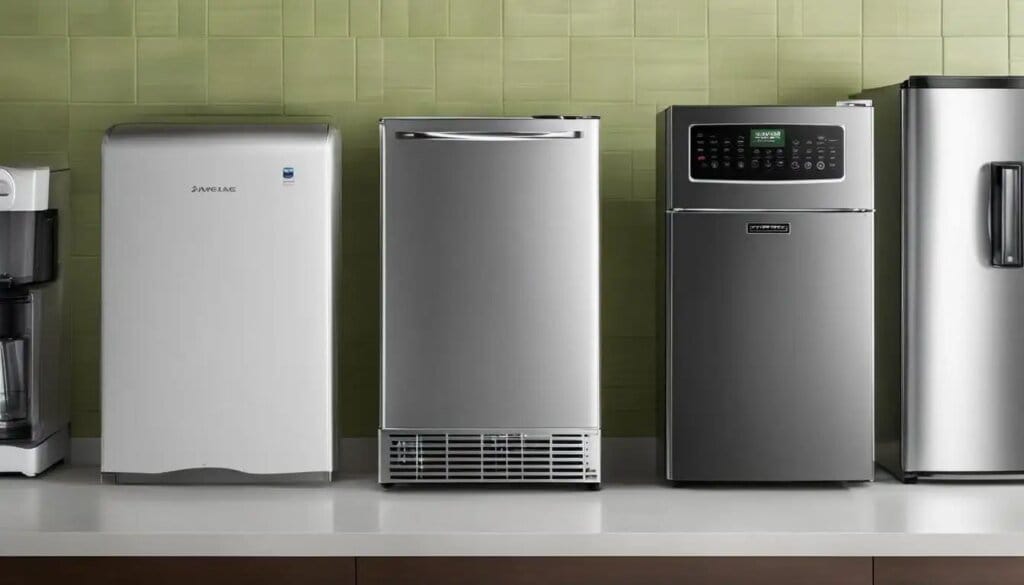
Finding The Best Appliance For Your Needs
It’s important to consider factors such as the available space in your living area or office, as well as the features and functions that align with your lifestyle.
Considerations Of Your Spaces
If you’re looking for a compact appliance for your living space, you’ll need to take into account the size of your area and any specific design requirements.
- Consider whether you have enough counter space or if you need an appliance that can fit under your counter.
- Think about the noise level of the appliance and whether it will be disruptive in your living area.
- For office spaces, space constraints and noise levels are also important considerations.
- You may need an appliance that fits neatly on a desk or in a small office kitchen area.
- Choose an appliance that won’t disturb your work environment while still providing the necessary functionality and convenience.
Features And Lifestyle Match
When assessing different compact appliances, it’s essential to look at their features and functions to ensure they meet your specific needs and lifestyle.
- Consider whether you require a mini fridge with a freezer compartment or a separate freezer.
- This will depend on whether you regularly need to freeze items or simply require cooling storage.
- Think about other features such as adjustable shelving, temperature control, energy efficiency, and storage capacity.
- These features can greatly enhance the usability and convenience of the appliance, ensuring it aligns with your daily routine and storage requirements.
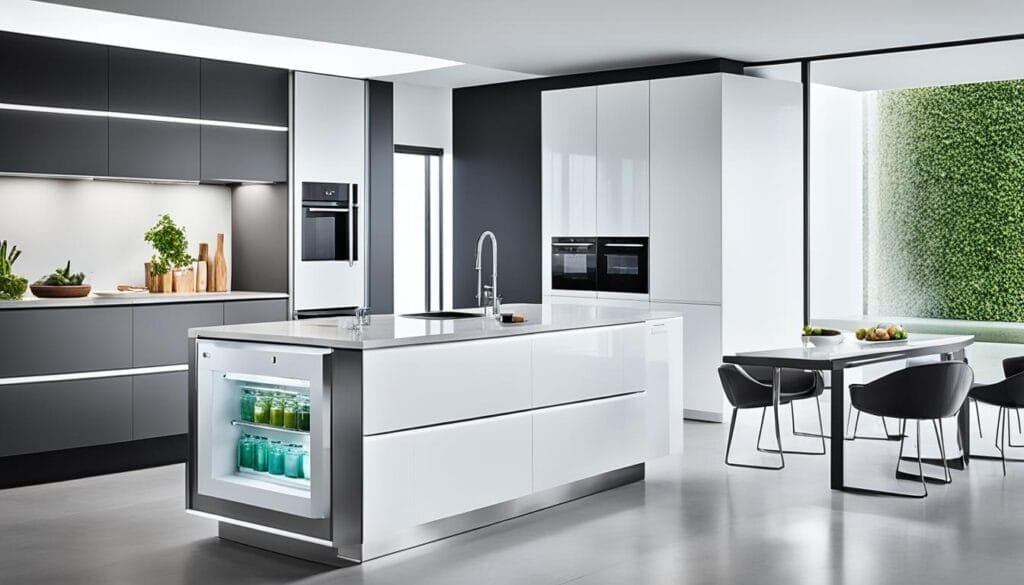
Bottom Line
Overall, when choosing between a mini fridge and a mini freezer, it ultimately boils down to your specific needs and preferences.
Mini fridges are perfect for storing perishable items and beverages, providing convenient cooling storage in small living spaces, dorm rooms, and offices. On the other hand, mini freezers are designed for freezing items like frozen meals and ice cream, making them ideal for those who frequently enjoy frozen treats.
As you make your decision, there are several key factors to consider. Think about the sizes and styles, the energy consumption and storage capacity of the appliance. Weighing the pros and cons of each option, evaluating performance factors such as temperature control and uniformity, and considering the features and benefits that matter most to you.
Happy cooling!
FoodiesFridge

